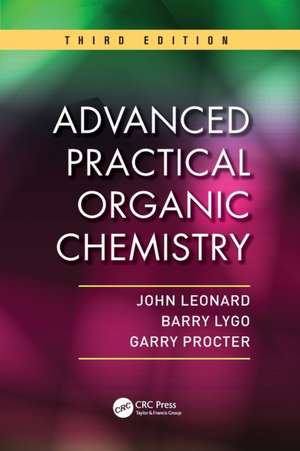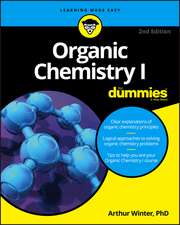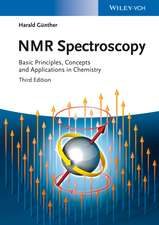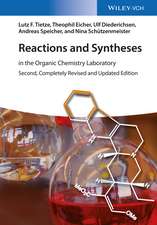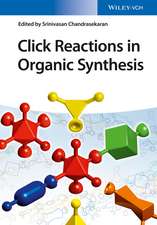Advanced Practical Organic Chemistry
Autor John Leonard, Barry Lygo, Garry Procteren Limba Engleză Paperback – 8 ian 2013
- Record keeping and equipment
- Solvent purification and reagent preparation
- Using gases and working with vacuum pumps
- Purification, including crystallization and distillation
- Small-scale and large-scale reactions
- Characterization, including NMR spectra, melting point and boiling point, and microanalysis
- Efficient ways to find information in the chemical literature
Preț: 564.07 lei
Preț vechi: 613.12 lei
-8% Nou
Puncte Express: 846
Preț estimativ în valută:
107.95€ • 117.22$ • 90.68£
107.95€ • 117.22$ • 90.68£
Carte disponibilă
Livrare economică 01-15 aprilie
Livrare express 15-21 martie pentru 31.64 lei
Preluare comenzi: 021 569.72.76
Specificații
ISBN-13: 9781439860977
ISBN-10: 1439860971
Pagini: 356
Ilustrații: 153 black & white illustrations, 20 black & white tables
Dimensiuni: 156 x 234 x 20 mm
Greutate: 0.48 kg
Ediția:Revizuită
Editura: CRC Press
Colecția CRC Press
Locul publicării:Boca Raton, United States
ISBN-10: 1439860971
Pagini: 356
Ilustrații: 153 black & white illustrations, 20 black & white tables
Dimensiuni: 156 x 234 x 20 mm
Greutate: 0.48 kg
Ediția:Revizuită
Editura: CRC Press
Colecția CRC Press
Locul publicării:Boca Raton, United States
Public țintă
Graduate and advanced undergraduate students and industrial organic chemists, particularly those involved in pharmaceutical, agrochemical, and other areas of fine chemical research. Biochemists, biologists, genetic engineers, material scientists, and polymer researchers.Recenzii
Praise for Previous Editions
"…concise and highly readable … I would recommend this book as an essential purchase for all new research students in the area of organic synthesis"
—Synthesis, June 1995
"This book should be present in every organic chemistry research laboratory…a bargain at the price."
—Chemistry & Industry, July 1995
"Reading this book is like having a thoughtful and smart tutor guiding all your steps in the laboratory…excellent choice.."
—Physical Sciences Educational Reviews
Praise for the Second Edition:
"… an essential purchase for all new research students in the area of organic synthesis."
—Synthesis
"This book should be present in every organic chemistry research laboratory…"
—Chemistry & Industry
"Reading this book is like having a thoughtful and smart tutor guiding all your steps in the laboratory … excellent choice."
—Physical Sciences Educational Reviews
"…concise and highly readable … I would recommend this book as an essential purchase for all new research students in the area of organic synthesis"
—Synthesis, June 1995
"This book should be present in every organic chemistry research laboratory…a bargain at the price."
—Chemistry & Industry, July 1995
"Reading this book is like having a thoughtful and smart tutor guiding all your steps in the laboratory…excellent choice.."
—Physical Sciences Educational Reviews
Praise for the Second Edition:
"… an essential purchase for all new research students in the area of organic synthesis."
—Synthesis
"This book should be present in every organic chemistry research laboratory…"
—Chemistry & Industry
"Reading this book is like having a thoughtful and smart tutor guiding all your steps in the laboratory … excellent choice."
—Physical Sciences Educational Reviews
Cuprins
General introduction. Safety. Keeping records of laboratory work. Equipping the laboratory and the bench. Purification and drying of solvents. Reagents: Preparation, purification, and handling. Gases. Vacuum pumps. Carrying out the reaction. Working up the reaction. Purification. Small-scale reactions. Large-scale reactions. Special procedures. Characterization. Troubleshooting: What to do when things don't work. The chemical literature. Appendices. Index.
Notă biografică
John Leonard is currently a principal scientist at AstraZeneca Pharmaceuticals, where he is primarily involved with synthetic route design and development activities. Prior to this he was a professor of organic chemistry at the University of Salford, UK.Garry Procter is a professor and director of teaching in the School of Chemistry at the University of Manchester, UK. Before this he was director of undergraduate laboratories in the Department of Chemistry and Chemical Biology at Harvard University.Barry Lygo is currently a professor of chemistry at the University of Nottingham, UK, working in the field of asymmetric catalysis and synthesis.
Descriere
With an emphasis on the most up-to-date techniques commonly used in organic synthesis, this third edition reference draws on the extensive experience of the authors and their association with some of the world’s leading laboratories of synthetic organic chemistry. Written mainly for graduate and advanced undergraduate students as well as industrial organic chemists, this book provides sufficient guidance to allow the researcher to carry out reactions under conditions that offer the highest chance of success. It offers fully updated information and re-drawn figures to illustrate the information at the highest possible standard.
